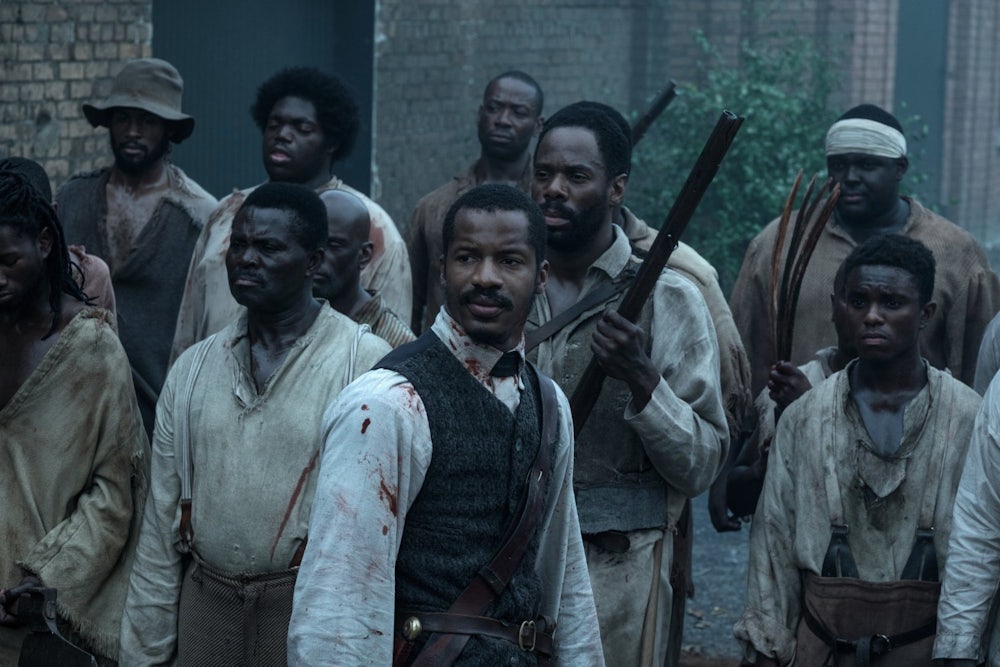For white Americans, The Birth of a Nation may be one of the most uncomfortable viewing experiences a moviegoer can have this year. There have been other films about slavery—some, like 12 Years a Slave, are far better than this—but writer-director-star Nate Parker has made a film that reverberates with anger, one that makes the villainy and brutality of racism that allowed slavery to exist not as a product of the past, but as a horror of the present. This is a biopic as blunt-force trauma. In Birth of a Nation the horror is two-fold, both in its depiction of slavery and in its bloody dramatization of Nat Turner’s 1831 rebellion. Even when the film stumbles, the righteousness of Parker’s cause is always on-point.
Nat Turner (Parker) lives on a Virginia plantation owned by Samuel Turner (Armie Hammer), who is portrayed as a relatively benign master, as far as slave owners of the time go. Taught to read by Samuel’s mother (Penelope Ann Miller), who gives him the Bible because she believes it’s the only book appropriate for blacks, Nat becomes a fervent believer, preaching the Lord’s word of obedience and mercy to his fellow slaves. Soon, other slave owners realize Nat’s eloquence can be used to keep their slaves in line, and so they start paying Samuel to have Nat preach about slaves receiving their reward in the afterlife.
Initially Nat doesn’t realize he’s part of a systematic indoctrination, a way to keep his fellow slaves down by twisting God’s teachings into a guide for being submissive. But it doesn’t take long for Nat and Samuel to see the inhumane treatment that’s rampant on other plantations. Samuel is disturbed but says nothing; but for Nat, it’s a dawning of the racial inequality that he’s been raised into thinking was perfectly acceptable.
Parker, who’s appeared as an actor in Red Hook Summer and Beyond the Lights, makes his feature directorial debut here, and he is both strengthened and hamstrung by the passion he brings to a project he’s been developing for years. The Birth of a Nation very much feels like a story told by a true believer, and Parker often lets his enthusiasm get in the way of nuance. The film exudes a battering-ram simplicity that, even in its quieter moments, can give the drama a paint-by-numbers crudity. At its core, The Birth of a Nation is a Braveheart-like martyr narrative with a slightly bland hero facing off against some generically horrible racists—most notably, Jackie Earle Haley’s drawling, repugnant enforcer.
But if The Birth of a Nation’s storytelling isn’t particularly captivating—Nat’s love affair with fellow slave Cherry (Aja Naomi King) never sparks to life—the film’s thematic impact is always gripping. Parker credibly fashions a universe in which suppression is treated as the norm, dispensing with the notion that the antebellum South had “good white people.” We see some who might fit that description—Hammer’s Samuel is a decent man who believes there’s no reason to torture his slaves—but The Birth of a Nation never lets us forget that they are just as complicit as their more barbaric brethren. Eventually, they’re all going to have to pay for their sins.
Parker is a handsome, commanding presence when he’s preaching, particularly when Nat begins to adopt the Bible’s fire-and-brimstone passages as a call to arms. But he can’t bring his historical figure to life; the character is all stoic nobility. Ironically, it’s Samuel who has the more interesting arc, as an ostensibly honorable man who resorts to the same sort of callous treatment of his slaves when his social standing among his fellow whites is threatened. Samuel embodies a kind of passive evil that, I suspect, was far more rampant than the frothing-at-the-mouth racism we often see in the movies. The Birth of a Nation argues that it’s the Samuels of the world who are the real problem: decent people sitting by and letting injustice flourish.
This is where the movie twists the knife on its white audience. As with Holocaust films, slavery dramas have to work against a viewer’s privileged position in the present, immunized from the past’s atrocities. The Birth of a Nation builds to Nat’s famous armed insurrection that killed about 60 whites, and the movie shows no mercy to the slave owners who are butchered with axes and knives, including Samuel. This kind of movie will usually make a few subjugators sympathetic so that we can identify and, conveniently, not feel responsible—Nate Parker will have none of that. Without saying it explicitly, Parker makes the case that all white Americans watching his movie are connected to slavery—that we all, in some small way, have it coming.
It’s a provocative stance, one expressed with anger, frustration, and a cathartic sense of enough’s enough. Parker isn’t advocating riots or violence, but he does want his white viewers to understand generations of black misery and antipathy. You can pick apart The Birth of a Nation’s creative limitations—and you’re welcome to debate whether the rape charges against Parker nullify his moral authority—but that underlying societal scar isn’t healing; if anything, it’s getting worse. In the nine months since I first saw The Birth of a Nation at Sundance, news reports about police shootings and the rise of Black Lives Matter only made a recent second viewing feel more prescient than ever. I’m betting that The Birth of a Nation won’t age well—its urgency may soon make it feel reactionary—but for now, it does capture the swirling racial unrest that’s roiling this country. White viewers will have a tough time with this film. That’s probably why they should see it.
Grade: B
Grierson & Leitch write about the movies regularly for the New Republic and host a podcast on film. Follow them on Twitter @griersonleitch or visit their site griersonleitch.com.
